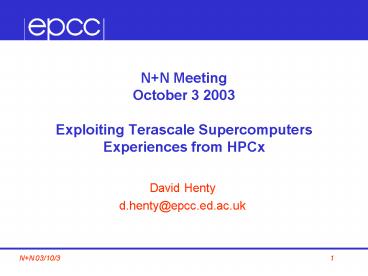N N Meeting October 3 2003 Exploiting Terascale Supercomputers Experiences from HPCx
1 / 19
Title:
N N Meeting October 3 2003 Exploiting Terascale Supercomputers Experiences from HPCx
Description:
Consortium of leading UK organisations committed to creating ... on almost all systems, a 'Grim Reaper' must be run by hand! eg I am running 128 processes ... –
Number of Views:65
Avg rating:3.0/5.0
Title: N N Meeting October 3 2003 Exploiting Terascale Supercomputers Experiences from HPCx
1
NN MeetingOctober 3 2003Exploiting Terascale
Supercomputers Experiences from HPCx
- David Henty
- d.henty_at_epcc.ed.ac.uk
2
Overview
- HPCx
- the machine
- the consortium
- Usability issues
- a brief summary
- HPCx, EPCC and the Grid
- current activities
- DEISA
- Distributed Infrastructure for Supercomputing
Applications - an EC-funded pan-European Grid testbed proposal
3
What is HPCx?
- Consortium of leading UK organisations committed
to creating and managing the new UK HPC resource
for the next 6 years
Multi-stage project to deliver a world class
academic computing resource, the largest in
Europe, with ultimate peak performance of 22
TFlop/s
- 50M/70M budget from EPSRC
- Grid-enabled, a key component in the UK e-Science
program
4
The HPCx Consortium Members
- University of Edinburgh
- Edinburgh Parallel Computing Centre
- Central Laboratory of the Research Councils
Daresbury Laboratory
- IBM
5
University of Edinburgh
- Lead contractor of the HPCx Consortium
- International centre of academic excellence
- One of the largest and most successful research
universities in the UK
- Partner in the National e-Science Centre (NeSC)
6
The HPCx Consortium
7
The HPCx Consortium EPCC
8
- Leading computer centre in Europe, bridging the
gap between academia and industry
- Self-funding, in existence for over 10 years
- Provides both HPC and novel computing solutions
to a wide range of problems and users
- Long experience of providing national HPC
services including - Meiko Computing Surfaces
- Thinking Machines CM200
- Cray T3D/T3E (1994 to 2001)
9
Daresbury Laboratory
10
Daresbury Laboratory
- A multi disciplinary research lab with over 500
people
- Provides large-scale research facilities both for
UK academic and industrial research communities
- Daresbury hosts and maintains the hardware for
the HPCx system
11
- IBM will provide the technology for HPCx
- Long standing involvement in HPC including the
development of a number of ASCI machines and 5 of
the top 10 machines in the 6/2002 TOP500 list - No 2 ASCI White Rmax 7.2 TFlop/s
- No 5 SP Power3 (3328 Processors) Rmax 3.0
TFlop/s - No 8 pSeries 690 (864 Processors) Rmax 2.3
TFlop/s
- IBM has the long term technology road map
essential to a 6 year project such as HPCx
12
HPCx Operational Phases
- System will be commissioned in three main stages
with phase 1 covering 2002-2004 - phase 1 December 2002, performance 3 Tflops
Linpack - phase 2 June 2004 6 Tflops
- phase 3 June 2006 12 Tflops
- Focussed on Capability jobs
- using at least 50 of the CPU resource
- target is for half of the jobs to be capability
jobs
13
Usability Issues (i)
- Note these are NOT specific to HPCx or IBM!
- Batch systems
- not deeply integrated with the OS
- incompatibility between systems
- lack of useful information to the user
- Real time limits
- seem to be completely alien to UNIX
- accounting and charging therefore done by hacks
14
Usability (ii)
- Operating Systems
- written for multi-user, general-purpose systems
- desktop users work with the OS
- HPC users spend their whole lives fighting it
- we liked the Cray T3D because it DIDNT HAVE an
OS! - modern OSs are far too relaxed and sloppy
- eg runaway processes just run and run at 100 CPU
- ... on almost all systems, a Grim Reaper must
be run by hand! - eg I am running 128 processes
- ... is it a single MPI job? multiple MPI jobs?
mixed MPI/OpenMP? - spawn 100s of threads for tasks that arent
needed for HPC - IO
- MPI-IO is nice but I dont see people using it
- usually develop bespoke solutions which dont
port well
15
Usability (iii)
- What about accounting?
- Users have to buy CPU time (at least in the UK!)
- and be charged for it
- in a common currency
- almost zero support for users or administrators
to control resource allocation to projects,
groups and users - can be tape, disk, CPU, memory etc
- HPC centres have to develop their own software
- we wrote an application from scratch for HPCx
- If these things are hard on a parallel machine,
just think how hard they will be on the Grid!
16
Grid Actvities
- HPCx
- available over the Grid via Globus 2
- issues due to back-end CPUs being on a private
network - EPCC
- part of Globus Alliance along with Argonne, ISI
and PDC - planning the direction of the Globus toolkit
- many e-Science projects, collaborations with
NeSC, etc. - DEISA
- a 5-year project in the pipeline, under
negotiation with EC - 9 partners in 7 countries, requested budget
around 14M
17
DEISA Vision
18
DEISA Overview
- A bottom-up approach to an EU Grid
- most of the sites have IBM hardware (a
coincidence in time) - a US TeraGrid on the cheap with little (initial)
hardware - using the best available commodity software
- Major focus is shared file system
- initially extending GPFS
- also investigate other technologies (AFS, Avaki,
...) - EPCCs involvement
- ensure HPCx is integrated
- develop a Cosmology application demonstrator
- develop OGSA middleware to enhance heterogeneity
19
Simulation by the OCCAM group































